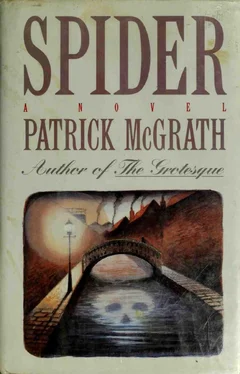Bad years, then, the early years, years of persecution. The first months were the hardest in this regard, before I adapted to their ways. (It is much more difficult to speak of those days: see how upright I sit on my bench now, staring at the pilings in the river as a screaming sea gull sweeps by in the gusting wind, and how white-knuckled my bony hands are, clasped on the handle of the umbrella.) For they would have made me their creature had I not found the means to resist. See me, then, in a cold tiled room at the front of the admissions ward, bathed and disinfected, stark naked and shivering: a long, ribbed, skinny boy, his pimpled skin white as milk, with terror in his eyes. They have taken my clothes away and are about to issue me the standard grays of the institution. So the old me, the lad from Kitchener Street, the Spider of London, has been stripped away; and before I assume the uniform of a lunatic there are these few minutes that I am naked in that bleak tiled room, that I am truly nothing, neither the one thing nor the other, and here’s an odd thing: I am seized, in those minutes of bare shivering nothingness, with a feeling so intense as to make me laugh out loud; and the attendant turns from the table, where he is busy with my few pitiful possessions, and frowns at me as I hop from foot to foot and try to stifle waves of an inexplicable joy—soon extinguished as I struggle into a shirt too small and trousers too wide, and a pair of thick-soled asylum shoes from which the laces have been removed. He has taken my pencil, and the few coppers I possessed, and sealed them up in a brown envelope with my name and the date scrawled on the front, and told me they’ll be returned to me when I leave. So while I entered that room as Spider of London, I stepped out of it a lunatic, unrecognizable to myself; and the terror, momentarily extinguished by that brief odd gush of hilarity, returned then, and all I was aware of was the touch of alien material on my skin, and the alien smells in my nostrils. Now I was afraid, desperately afraid, more frightened than ever I remembered being in my life before, and all I wanted was to be back in my room above the kitchen in number twenty-seven. But that odd laughter: I believe, now, that what I was feeling was relief.
John Giles was the first patient I encountered on the admissions ward, John with his great shoulders and shaggy eyebrows. He was admitted to Ganderhill the same day as me: when I first saw him he was facing a wall near the front of the ward and chattering to himself with great rapidity and animation. Beyond him, further down the ward, a little bald man sat on the floor moaning gently as he plucked repeatedly at the collar of his shirt, and beyond him, frozen to his spot like a statue, a man stood gazing at his own open palm and splayed fingers. I must have paused, there on the threshold, for I remember the attendant murmuring, “Come on, son, down we go.”
Down we went. A few men wandered the ward, most were locked in cells with barred gates for doors and bunks of solid concrete. These men wore canvas gowns and lay sleeping on the concrete with their knees drawn up to their chins. One man, his eyes wild and his hair standing up off his head in damp spikes, rushed to the gate as I passed and gripping the bars cackled at me till the attendant moved toward him with an uplifted hand and he shrank back with a whimper of distress. Halfway down the ward the gate of an empty cell was unlocked and rolled back on rattling metal casters. “Here we are, son,” said the attendant. “I won’t lock you up for the time being.” I stood there staring in: a small barred window high in the wall, a lidless, seatless concrete toilet, and a concrete bunk. “Just stay out of trouble, son,” he said, “and we’ll soon have you downstairs.” He was as tall as me, this man, whose name I later learned was Mr. Thomas. He turned and made his way back down the ward, glancing from side to side as with one hand he gently slapped a large key into the palm of the other. See me then: sitting on the edge of the concrete bunk with my elbows on my knees, my hands dangling limp between my legs, and my head hung low. There was a hot choking feeling in my throat;
I stared, blinking, at the floor and watched two or three tears fall between my feet. A shadow fell across the cell; I looked up, startled: it was John Giles, the giant. “Got any snout?” he said. I shook my head; he shuffled off.
I ate my supper in my cell, from a paper plate with a wooden spoon, and shortly afterwards I was issued a pair of blankets and three sheets of toilet paper. Then my gate was slammed closed with a great clattering bang! and the lights were turned off, all but one or two that spread a dim glow down the middle of the corridor, enough for me to see the man in the opposite cell. I lay down on my bunk, and for the first time learned to use a shoe for a pillow. The sounds of the ward changed; the men I’d seen curled on their bunks with their knees pulled up to their chins seemed to awaken with the darkness, and now there arose such a piteous clamor of groans, and cries, and whimpers that I clapped my hands to my ears and lay there, on the concrete, rigid, my eyes wide and staring at the ceiling, where the glow from the corridor cast a weirdly elongated grid of bars across the plaster. Even so I couldn’t escape the voices, and after some minutes I was pacing back and forth across the cell, still clutching my head and muttering feverishly to try and drown out with my own voice the unbearable anguish of theirs. Then there was an attendant at my gate. “Settle down, son,” he murmured, “don’t get upset.” I said nothing; I stood in my cell and gazed at the man. After some moments he said, “Lie down, son,” and I did. He went away, and I heard him silence the moaning and whimpering, until the ward was almost quiet. I lay there for what seemed an eternity, watching the skewed grid of shadows on the ceiling, and then I began to see the cobwebs in the roof of my father’s shed; from this I derived comfort of some kind, for I managed to sleep then.
The next days passed in alternating cycles of monotony and hell. I easily became distraught and agitated—hardly surprising—and soon I’d lost my shirt and trousers and was locked up in an untearable canvas gown. Oh, this was the low point; I shudder, now, to think of what I must have been going through to do the things I did. Such was my despair, my pain, the sheer bloody wretchedness and misery of my isolation that I flung off my gown and used my own feces to write my name on the wall—my real name, that is, Spider,
I mean, daubed and smeared in damp brown clots across the plaster—and now see me, hunkered naked on my hams and grinning at the wall where my own name drips in shit in letters two feet high, and for a few brief minutes I am my own creature, not theirs, not theirs. But then see how I’m marched ungently down to the bathroom while my cell is scrubbed down with hot water and coarse bleach, confirmed, in their eyes, as a lunatic, by this dirty deed, though in my own eyes the reverse!
Bad days, then, though in time I learned, as I say, to build up the old two-head system and give them a lunatic while the Spider stood aloof. This was partly due to tobacco: in Ganderhill tobacco was one of those rude struts men used to give their days shape. There was an issue after breakfast and an issue after supper, from the tin at the front of the ward. I soon learned to join the others when they lined up for it, though it wasn’t so much the tobacco that yielded the pleasure, it was, oddly, the scarcity of the stuff, the paltriness of the morning issue that made you impatient for the evening (having smoked it all by noon) and then in turn it was finishing the evening issue that made you look forward so avidly in the long sleepless hours of the night to the morning. The pleasure was all in the delay, the anticipation; and this is how they made you their creature, for if you got into trouble you lost your tobacco, and the whole sweet rhythm of anticipation and satisfaction disappeared from the day; and what a bleak and dreary day that made it! So this too prompted me to build up the old two-head system, for if I gave them a good lunatic they gave me tobacco, twice a day, for me to hoard or smoke as I chose. Not that tobacco could do everything: men still banged their heads against the wall till they bled, they tore out their stitches, they burned holes in their flesh with cigarettes, they stuffed their gowns down the toilet then flushed till the water flooded the cell and went streaming down the corridor. For this was a hard-bench ward, and we were there because we failed; but I did learn to give them a good lunatic, and it was at that point they decided I was ready to see Dr. Austin Marshall.
Читать дальше












